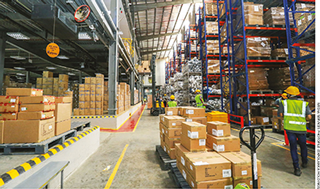SECTOR PERSPECTIVES
Destined for Success
Expolanka Holdings highlights the changes needed in the export sector
Q: Are Sri Lankan exporters doing enough to foray into new or emerging markets, in your view?
A: I believe that the entry of apparel into the export segment has enabled it to find its way and permeate emerging markets.
 This is thanks to the world renowned brands that have entered and explored the opportunities at hand within these very markets, including those spanning across the Middle East, the CIS, Russia, India, China and South Asia.
This is thanks to the world renowned brands that have entered and explored the opportunities at hand within these very markets, including those spanning across the Middle East, the CIS, Russia, India, China and South Asia.
Sri Lankan production has not picked up as much and displayed minimal success despite its potential with tea considered the only exception in this regard. There is a dire need to hold trade fairs in emerging markets to promote the exports of the country – and this should ideally be facilitated by the state.
From our standpoint, participation in international promotional exhibitions and forums – and their frequency – has been far from satisfactory.
It is limited to only the able and informed entities that have the means of accessibility, and are frequently subscribed to these types of events.
Generating the right kind of awareness is vital to creating an opportunity while branching out into new markets. Preparations for such promotions should be carried out well in advance with adequate lead time to research and develop products that are in high demand within the respective markets that are approached.
Q: Do quality management and environmental concerns receive adequate attention vis-à-vis exports?
A: Inadequacy of awareness and disrespect or ignorance of compliance standards has cost manufacturers, exporters and traders immensely. As quality is a mandatory requirement that buyers demand from the outset, it is unfortunate that this procedure is met at a bare minimum whilst environmental concerns are continuously taken for granted, and limited to certain screening procedures and certifications.
 The need to far exceed the quality standards beyond the bare minimum with continuous improvements and respect for the environment as a nation is imperative. With the prevailing global landscape of markets, the consumer’s progress towards being extra cautious regarding environmentally damaging products and their negative impacts has gained increasing momentum.
The need to far exceed the quality standards beyond the bare minimum with continuous improvements and respect for the environment as a nation is imperative. With the prevailing global landscape of markets, the consumer’s progress towards being extra cautious regarding environmentally damaging products and their negative impacts has gained increasing momentum.
In recent years, products that endorsed the least environmental damage have emerged victorious in terms of market acceptability and customs. Therefore, investment in this all-important area of concern will help sustain the environment and gain the preference of consumers at higher prices.
It should be noted that initiatives in the form of national campaigns can only highlight the importance of this and induce the relevant authorities to help with the technical guidance required.
Q: Should Sri Lanka look to set up further FTAs, in your opinion?
A: I believe that FTAs are a desired element to strengthen Sri Lankan trade. Many countries in the region with far more FTAs are said to have benefitted. For instance, the South Asian Free Trade Area (SAFTA) is proven to have a general trade effect on member countries and more inclined to lead to trade creation.
If the government, the Department of Commerce or any other such relevant body plays an active role in this regard, FTAs will certainly facilitate market access to improve trade.
However, FTAs are of no use if the pacts will not be beneficial to both countries. In most cases, poor monitoring and a high-handed approach of the partnering country have meant that Sri Lanka ended up with a raw deal.
Another matter of concern is ignorance and the lack of publicity of FTAs, which are often connected to protectionism among the business fraternity.
The above-mentioned reasons can certainly create a negative notion in the public eye regarding FTAs.
Q: Have adequate measures been taken to simplify the processes related to export activity?
A: No. The process is complex. Entrepreneurs may become frustrated as they struggle to find a single location that provides guidance for registering an enterprise and obtaining a Taxpayer Identification Number (TIN) among other related approvals to facilitate an export.
If at all, one must visit several websites to collate information or approach a number of institutions with request letters and submit forms, and may have to wait for an indefinite period of time.
The need for a one stop shop online solution with all the information required for different exports – including related guidelines, concessions, financial assistance, rebates and so on – offered with online submissions should be considered the order of the day.
And the online submission of the Customs Declaration (CUSDECO) and obtaining Certificates of Origin (COOs) are not the only facilitation that exporters desire. Instead, an online e-commerce platform connecting all stakeholders is one that is most desired.
Sadly, something of this nature has not materialised in this era where we continue to struggle with the validation of legal acceptance of an electronic signature.



